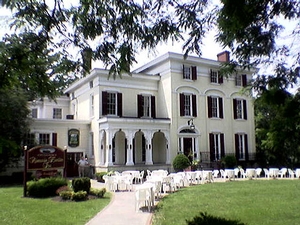Miracles on Clinton's West Park Row
by Professor Theodore Eisemer
PROFESSOR OF GOVERNMENT
A plaque on a storefront at one end of West Park Row in the Village of Clinton commemorates the remarkable story of two Hamilton graduates purchasing the failing Clinton Pharmaceutical Company in 1887 for five-thousand dollars and turning it into Bristol Myers, one of the world’s largest pharmaceutical firms. One hundred and twenty years later, three Hamilton faculty members— Professors Ambrose, Bradfield and Paquette— and some generous benefactors purchased the bankrupt Alexander Hamilton Inn at the other end of West Park Row with the dream of creating a nationally recognized center of excellence in the study of freedom, capitalism and democracy. The Alexander Hamilton Institute (AHI) is young, but its achievements in three short years have been remarkable.
At the beginning of the Fall 2006 semester, Hamilton College announced with great fanfare that the President and Dean of Faculty had signed an agreement to use a generous gift from Hamilton Trustee Carl Menges to establish the Alexander Hamilton Center (AHC) on campus. Soon, however, a majority faction of faculty, ostensibly concerned about issues of “governance,” voiced its opposition to the proposed center. When some trustees also raised concerns, the College reneged on the deal. By the end of the semester, the AHC was dead.
Less than a year later, on Constitution Day in 2007, the Alexander Hamilton Institute, an independent 501 c3 organization, rose phoenix-like from the ashes of the Alexander Hamilton Center. Undaunted by the College’s flip flop, the founders had gone rogue— securing financial support, purchasing and refurbishing the Inn, recruiting distinguished individuals to serve on AHI’s Board of Directors and Board of Academic Advisors and planning ambitious programs.

The results have been stunning. The AHI has held three major national colloquia: on abolitionist Gerrit Smith, Class of 1818 at Hamilton College, on property rights and on the relationship between the Declaration of Independence and the Constitution— with another, on technology and American representative government, planned for this spring with a keynote address by Marc Elias ’90. Hamilton students play a major role in these colloquia. The Institute has brought a bevy of prominent scholars and public intellectuals to Clinton, many of whom have spoken at Hamilton and leavened the monotonous fare of politically correct programming on campus. Students and faculty from across the country have attended AHI summer seminars on subjects ranging from Machiavelli and Shakespeare to the works of Frederick Douglass, Booker T. Washington and W.E.B. DuBois.
The ranks of AHI Undergraduate Fellows include more than 70 diverse and talented Hamilton students. This spring, several of the fellows will join students from Princeton and Georgetown in presenting papers at a Conference on the American Polity sponsored by the James Madison Program in American Ideals and Institutions and the Tocqueville Forum on the Roots of American Democracy. Fellows regularly attend leadership luncheons with visiting scholars to discuss their work.
Walk in to the AHI on any given night and you will see students engaged in intense intellectual activity on their own time for no credit— participating in a reading group about Friedrich Hayek, discussing the relationship between faith and reason, studying the core texts of the American founding, wading in to current debates about American exceptionalism, arguing about the meaning of the Tea Party or the 2010 election. In most of these events, students interact not only with faculty but with local citizens, making AHI a 21st century Chautauqua.
As it turned out, the banishing of AHI may have been a blessing in disguise. Without political interference and the bureaucracy that makes academia as nimble as the Titanic, the power of big ideas cutting across disciplinary boundaries has fueled AHI’s development. In contrast to some outfits on the Hill, AHI has almost no administrative overhead. The stately headquarters in Clinton has become a home away from home for students looking for engagement, civility and intellectual diversity.
Hamilton is fortunate to have such a neighbor. AHI could enhance the Hamilton brand just as the Madison Program does for Princeton and the Tocqueville Forum does for Georgetown. Yet, the College has not welcomed AHI with open arms, moving from thinly veiled hostility to what might be charitably described as benign neglect. While students flock to AHI, some members of the faculty shun it.
To the administration and faculty, I offer this advice: If you can’t beat ’em, join ’em. AHI is not a right wing redoubt. It is a big tent of scholars, students and citizens having serious and civil discussions about important issues. Hamilton College’s proclaimed commitment to diversity ought to include intellectual diversity. To students, I extend this invitation: Join the miracle on West Park Row. In this “unsafe zone,” your ideas will be tested and challenged, and you will encounter those with whom you disagree. But you will enjoy every minute in this passionate and supportive community of learning that is restoring some of the best traditions of a Hamilton education.
Four years have passed since the College snatched defeat from the jaws of victory by voting for the AHC before voting against it. With the announcement just last month of a major multi-year grant to support its innovative programming, AHI’s star continues to soar. Perhaps the time is coming to hit the reset button in relations between the Hamilton on the Hill and the Hamilton on the Row.
